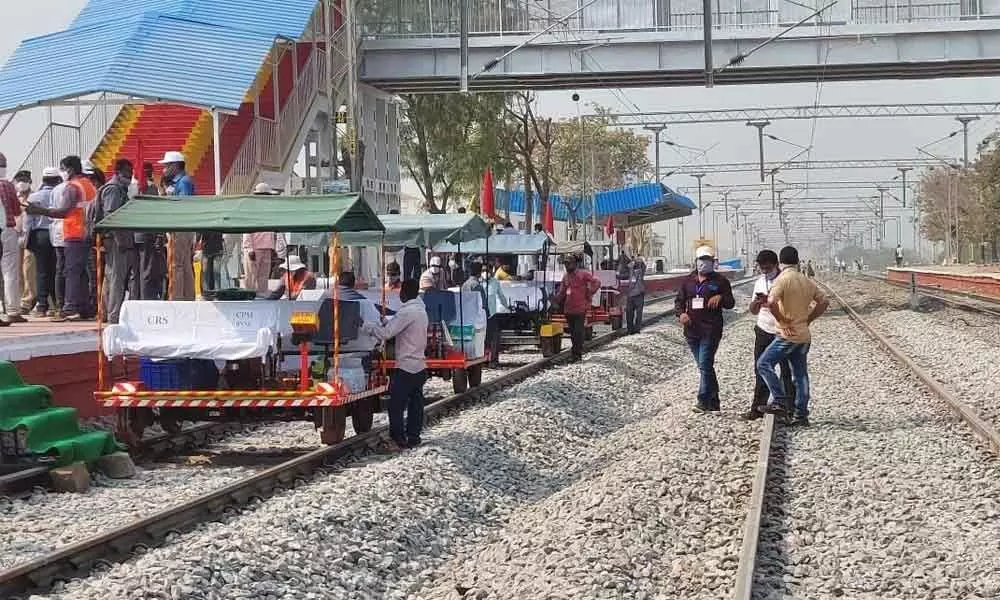Live
- They always want me to win, and now I feel lucky to have been offered a story like ‘Zebra’: Satyadev Kancharana
- ‘Democracy first, humanity first’: PM Modi in Guyana's parliament on two countries' similarities
- PKL Season 11: Telugu Titans register third straight win to top standings
- Is Pollution Contributing to Your COPD?
- NASA Unveils Underwater Robots for Exploring Jupiter's Moons
- Additional Central forces arrive in violence-hit Manipur
- AR Rahman and Saira Banu’s Divorce: Legal Insights into Common Issues in Bollywood Marriages
- 82.7 pc work completed in HPCL Rajasthan Refinery area: official
- Curfew relaxation extended in 5 Manipur districts on Friday
- Tab scam prompts Bengal govt to adopt caution over fund disbursement
Just In
Falaknuma: A key phase of MMTS-II project commissioned


A key phase of MMTS-II project commissioned
- Now, with the completion of construction of double line along with electrification between Falaknuma and Umdanagar, the MMTS Phase- II project envisaged for a distance of 84 km has reached final stage of completion
- The four stations falling in the Falaknuma – Umdanagarsection viz., Falaknuma, NPA Shivarampally, Budvel and Umdanagar have been provided new station buildings, high level platforms, foot over bridges, wide circulating area, parking facilities etc
Falaknuma: The South Central Railway has taken one more important step towardsthe progression of MMTS Phase-II project by completing and commissioning DoubleLine with Electrification between Falaknuma and Umdanagar.
The new double linehas been constructed for a distance of 13.98 km.In addition to the track doubling and electrification, associatedinfrastructural developments have also been carried out.
Multi Modal Transport Service (MMTS) is one of the cheapestand economical modes of suburban transport in the twin cities. The network connects Falaknuma, Secunderabad, Hyderabad,Lingampalliand Ramachandrapuram stations. In the first phase, MMTS Phase-I network was extended for a distance of 42 km.
With a view to expanding the suburban services, MMTS Phase- IIproject has been proposed for a distance of 84 km, executing different worksincluding new line between Tellapurand Ramachandrapuram in the western part of city; electrification between Secunderabad and Bolarum; double line with electrification between Bolarumand Medchalon the northern side of city; Quadrupling(4 lines)with electrification and automatic signalling (in place of existingdouble line) between Ghatkesarand Moula Ali to ease; doubling with electrification between Falaknumaand Umdanagarin the southern part of city; Doubling and electrification betweenMoula Ali and Sitaphalmandi, conncecting –Malkajgiri;and doubling with electrification betweenMoula Ali and Sanathnagar along with construction of 5 new stations in thesection for providing east-west connectivity bypassing Secunderabad station.
Works are being executed by Rail Vikas NigamLimited (RVNL) in a phased manner. Already, new rail line works between Telapur and Ramachandrapuram, electrification between Secunderabad and Bolarum,electrification and doubling between Bolarumand Medchal and quadrupling betweenMoula Ali and Ghatkesar have been completed and commissioned.
Now, with thecompletion of construction of double line along with electrification betweenFalaknumaand Umdanagar, the MMTS Phase- II project envisaged for a distance of 84 km has reached final stage ofcompletion.
Falaknuma-Umdanagar is an important rail line connectingSecunderabad, Kacheguda with Kurnool city, Guntakal, Bengaluru and down south.Many passenger train services including AP and Karnataka SamparkKranthitrains ply through this route.
Construction of double line with electrificationhelps in easing the congestion of this important section and improves theoperational efficiency in dealing with all types of trains (suburban, passengerand Express). It facilitates operation of more freight trains aswell.
The four stations falling in the Falaknuma – Umdanagarsection viz., Falaknuma, NPA Shivarampally, Budvel and Umdanagar have beenprovided with all required passenger amenities including new station buildings, high level platforms, foot over bridges, wide circulating area and parkingfacilities.
As many as 24 bridges including major and bridges have been constructed inthe section. Out of 6 LC gates falling in the section, one road under bridge hasbeen constructed and remaining 5 LC gates have been provided with signalinterlocking.
SCR General Manager Gajanan Mallya complimented the Railway officials, RVNL authorities on completion andcommissioning of double line between Falaknumaand Umdanagar.
He opined thatcommissioning of this new line will ease the congestion enabling smooth andpunctual operation of train services in both passenger and freight segments.

© 2024 Hyderabad Media House Limited/The Hans India. All rights reserved. Powered by hocalwire.com






